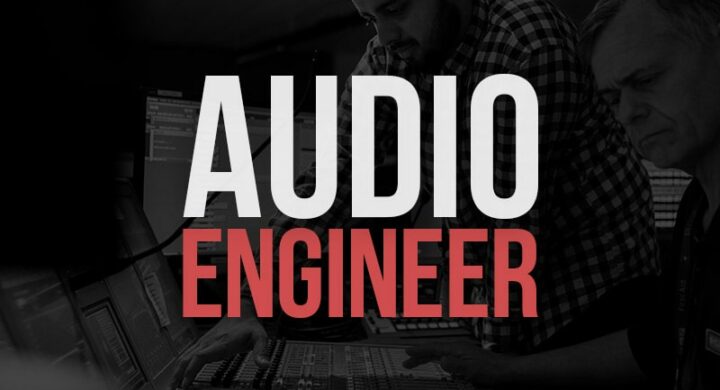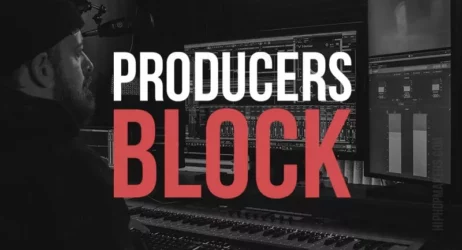This guide will answer what is an audio engineer, what they do, the different types of audio engineers, and how to get started.
What Is An Audio Engineer?
Audio Engineers, also known as recording or sound engineers, is the person who works with the mechanics of recording, mixing sound, and reproducing sound. They are responsible for the technical side of recording sessions and live performances.
- What is An Audio Engineer
- What Does an Audio Engineer Do
- Types of Audio Engineers
- What Is An Audio Engineer’s Salary
- How Do You Become An Audio Engineer
- Do You Need A Degree
- Schools For Becoming A Audio Engineer
- Time It Takes To Learn Engineering

What is An Audio Engineer?
The audio engineer usually works for a studio and knows everything about the recording studio. He knows which mics there are, which gear there is, how many cables, etc.
He can also plug in the microphone, do all the mic checks, and set up the tape machine.
An audio engineer is the one who usually operates all the gear, the console, and sometimes the audio record button.
Audio engineers often help the musicians and the record producers to give their work the sound they are hoping to achieve.
They can piece together the parts of the song, add synthetic sounds on the track, or use auto-tune on a recording.
It is important to consider that audio engineers can grow, and become a producer one day and although, before that, they perform the producers’ tasks.
What Does an Audio Engineer Do?
Audio engineers are the ones who operate the equipment that is required to record sounds for recordings. They also handle equipment that is required to produce the best sound for live performances like concerts.
They work on the technical aspects of recording. Some of their work includes:
- Placing the microphones
- Setting the levels
- Reducing unwanted sounds
- Setting the ambient sound microphones
- Repairing and maintaining the equipment
What Are The Different Types of Audio Engineers?
Here are some of the types of audio engineers:
1. Assistant Engineer
They work in the studio are often apprentices to studio engineers.
2. Recording Engineer
They focus mainly on the aspect of recording sound.
3. Studio Engineer
They work closely with music producers, and sometimes they also double as producers and work independently.
4. Game & Audio Design Engineer
They mainly work with sound engineering on video games and how to add sounds properly to the games.
5. Mastering Engineer
They smooth over the results of a mixed engineer. They make the final adjustments to a piece of recorded music before it is released.
6. Mix Engineer
They record, mix, and edit sound using audio and engineering equipment. They combine all different sonic elements of recorded music pieces into a final version.
7. Live Sound Engineer
They work at live events and ensure that the sound is high quality and of the proper value.
8. Monitor Engineer
They mix the sound that musicians listen to on stage during a performance. They are the ones who adjust sounds in a band’s monitor during a live performance.
9. Systems Engineer
In live performances, they manage the entire experience of sound. Monitor engineers and live sound engineers; both are managed by them.
10. Audio Post Engineer
They work to mix and edit audio for television and movies.
What Is An Audio Engineer’s Salary?
As per indeed.com, the average salary of an audio engineer in the United States is $24.15 per hour.
On the other hand, as per the careerexplorer.com, the average wage for a certified audio engineer in the United States is around $25.59 per hour.
How Do You Become An Audio Engineer?
Generally, there is no set accreditation required for becoming an audio engineer. But still, if you have enrolled in higher education, you will have an advantage if you are thinking of becoming an audio engineer.
You can do both Associate Degree as well as the Bachelor’s Degree in Sound Engineering.
| Degree Type: | Duration: |
| Associate Degree | 2 years to complete |
| Bachelor’s Degree | 4 years to complete |
After you get a degree or while you are already pursuing your degree, the first audio engineering job you will likely get is an Assistant Engineer.
Being an assistant engineer is also good at first because you can learn the trade and get used to the new line of work. You can also meet people and make new connections and do networking.
Note that networking is also important in audio engineering. Most often, you will be working as an independent contractor if you become an audio engineer instead of working for one company for a long time.
Do You Need A Degree To Be An Audio Engineer?
No, there’s no necessity of any college degree to become an Audio engineer.
In general, most people in the business don’t think of whether or not you have any degree or if you have gone to any school or not.
What matters in the music industry is whether or not you know how to do your job well. Whether for studio owners or clients, if you are good at your work, you will get the gigs; otherwise, you won’t.
With that being said, although a music degree may not be that important, the education behind that degree is really important, and you should think about it.
Here are some pros and cons of going to audio school:
| Pros: | Cons: |
| You’ll meet new people | It may be costly for you |
| You’ll learn all the fundamentals | You’ll only learn the fundamentals |
| You can use the best gear | You’ll likely not see those half amazing equipment again |
| You’ll earn a degree | Generally, no one really cares that you studied audio (practical skills are important. |
Are There Schools For Becoming A Audio Engineer?
Here are some of the audio engineering schools (Source):
- Fanshawe College
- University of Washington
- Musicians Institute College of Contemporary Music
- Ontario Institute of Audio Recording Technology
- Vancouver Film School
- Recording Arts Canada
- Metalworks Institute
- Full Sail University
- School of the Art Institute of Chicago
- Berklee College of Music
- Art Institute of Atlanta
- Los Angeles Recording School
How Long Does It Take To Learn Audio Engineering?
It takes some time to learn audio engineering, generally a few years. Audio engineering is not a thing that can be learned overnight just by playing with some tools and equipment.
Audio engineering programs usually last from 2-4 years. Like any other audio engineering occupation, you will always learn various new and useful techniques for your work.
Summary of Audio Engineers
The audio engineer, also known as the recording engineer or the sound engineer, is the person who handles recording, mixing and reproducing sound. They oversee the technical aspects of recording or live performances. Audio equipment is used to record, synchronize, mix, or reproduce music, voices, or sound effects.
I hope you found this information on audio engineers helpful.
If we missed anything, please share it in the comments.




